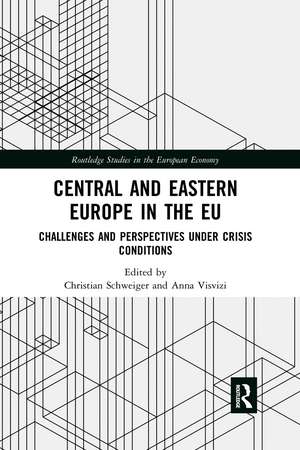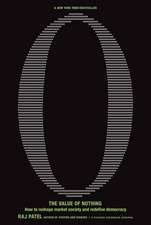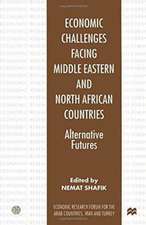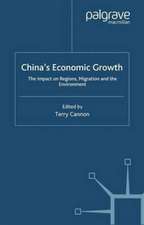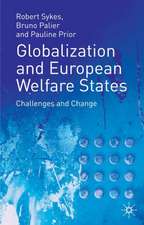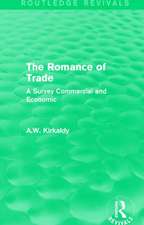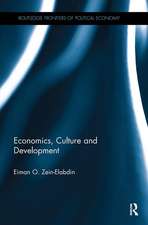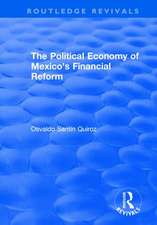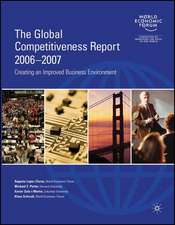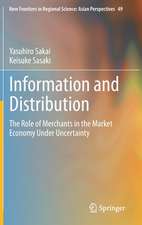Central and Eastern Europe in the EU: Challenges and Perspectives Under Crisis Conditions: Routledge Studies in the European Economy
Editat de Christian Schweiger, Anna Visvizien Limba Engleză Paperback – 18 dec 2020
This edited volume offers the first comprehensive and critical insight into how the CEEs position themselves in the EU’s changing internal and external environment, their stance towards the European integration process under current crisis conditions, and what political and economic strategies they prioritize.
| Toate formatele și edițiile | Preț | Express |
|---|---|---|
| Paperback (1) | 272.23 lei 6-8 săpt. | |
| Taylor & Francis – 18 dec 2020 | 272.23 lei 6-8 săpt. | |
| Hardback (1) | 764.62 lei 6-8 săpt. | |
| Taylor & Francis – 29 mai 2018 | 764.62 lei 6-8 săpt. |
Din seria Routledge Studies in the European Economy
-
 Preț: 324.39 lei
Preț: 324.39 lei -
 Preț: 303.89 lei
Preț: 303.89 lei - 20%
 Preț: 148.76 lei
Preț: 148.76 lei - 9%
 Preț: 934.49 lei
Preț: 934.49 lei -
 Preț: 311.41 lei
Preț: 311.41 lei -
 Preț: 316.32 lei
Preț: 316.32 lei - 18%
 Preț: 1057.13 lei
Preț: 1057.13 lei - 18%
 Preț: 1058.65 lei
Preț: 1058.65 lei - 16%
 Preț: 338.33 lei
Preț: 338.33 lei - 28%
 Preț: 524.79 lei
Preț: 524.79 lei -
 Preț: 494.48 lei
Preț: 494.48 lei - 26%
 Preț: 764.62 lei
Preț: 764.62 lei -
 Preț: 466.07 lei
Preț: 466.07 lei - 28%
 Preț: 823.63 lei
Preț: 823.63 lei - 18%
 Preț: 1057.09 lei
Preț: 1057.09 lei - 28%
 Preț: 818.71 lei
Preț: 818.71 lei - 26%
 Preț: 846.50 lei
Preț: 846.50 lei - 18%
 Preț: 1049.99 lei
Preț: 1049.99 lei - 18%
 Preț: 1004.20 lei
Preț: 1004.20 lei - 18%
 Preț: 1332.21 lei
Preț: 1332.21 lei - 31%
 Preț: 765.43 lei
Preț: 765.43 lei - 28%
 Preț: 848.15 lei
Preț: 848.15 lei -
 Preț: 223.01 lei
Preț: 223.01 lei - 18%
 Preț: 703.79 lei
Preț: 703.79 lei - 28%
 Preț: 847.50 lei
Preț: 847.50 lei - 18%
 Preț: 699.96 lei
Preț: 699.96 lei - 28%
 Preț: 828.12 lei
Preț: 828.12 lei - 18%
 Preț: 1159.70 lei
Preț: 1159.70 lei - 18%
 Preț: 1174.70 lei
Preț: 1174.70 lei - 18%
 Preț: 1057.89 lei
Preț: 1057.89 lei -
 Preț: 484.47 lei
Preț: 484.47 lei - 18%
 Preț: 711.10 lei
Preț: 711.10 lei - 28%
 Preț: 848.15 lei
Preț: 848.15 lei -
 Preț: 413.13 lei
Preț: 413.13 lei - 30%
 Preț: 849.65 lei
Preț: 849.65 lei - 28%
 Preț: 875.55 lei
Preț: 875.55 lei - 31%
 Preț: 762.58 lei
Preț: 762.58 lei - 18%
 Preț: 1437.35 lei
Preț: 1437.35 lei - 18%
 Preț: 1108.37 lei
Preț: 1108.37 lei -
 Preț: 495.09 lei
Preț: 495.09 lei - 15%
 Preț: 703.48 lei
Preț: 703.48 lei - 31%
 Preț: 763.81 lei
Preț: 763.81 lei
Preț: 272.23 lei
Preț vechi: 326.36 lei
-17% Nou
Puncte Express: 408
Preț estimativ în valută:
52.10€ • 56.57$ • 43.76£
52.10€ • 56.57$ • 43.76£
Carte tipărită la comandă
Livrare economică 23 aprilie-07 mai
Preluare comenzi: 021 569.72.76
Specificații
ISBN-13: 9780367734473
ISBN-10: 0367734478
Pagini: 234
Dimensiuni: 156 x 234 mm
Greutate: 0.44 kg
Ediția:1
Editura: Taylor & Francis
Colecția Routledge
Seria Routledge Studies in the European Economy
Locul publicării:Oxford, United Kingdom
ISBN-10: 0367734478
Pagini: 234
Dimensiuni: 156 x 234 mm
Greutate: 0.44 kg
Ediția:1
Editura: Taylor & Francis
Colecția Routledge
Seria Routledge Studies in the European Economy
Locul publicării:Oxford, United Kingdom
Public țintă
Postgraduate and UndergraduateCuprins
1. Introduction: The EU under crisis conditions: Central and Eastern European perspectives, Christian Schweiger & Anna Visvizi, Part I - Central and Eastern Europe in the EU's Changing Internal and External Dimension, 2. Positioning the CEE region in the EU's core-periphery divide, Christian Schweiger, 3. A Rift in European Integration? Neglected Shadows of the Central and Eastern European Transformation, Beáta Farkas & András Máté-Tóth, 4. Perpetual crises, the return of geopolitics and the emergence of a new normalcy in Central Europe, Anna Visvizi, 5. Central European Relations in Turbulent Times, Beata Farkas, Part II - National Perspectives: Between Good citizenship and Backsliding, 6. European Union at the Crossroads: Which Route will Poland Take?, Maciej Duszczyk, 7. Hungary in the Visegrád Group: Introducing a Three-Level Game Approach, Krisztina Arató & Boglárka Koller, 8. Slovakia: A Farewell to a Passive Policy-Taker Role?, Zsolt Gál & Darina Malová, 9. The Politics of Internal and External Migration in the Enlarged EU: Bulgaria and Romania, from Policy-takers to Policy-makers?, Nicole Lindstrom & Mihnea Cătuţi, 10. The Baltic States in the EU: Committed Europhiles or Geopolitical Hostages?, Liutauras Gudžinskas & Tomas Bekišas, 11. The New Kid on the Block: Croatia’s EU Membership in the Shadow of the Eurozone Crisis, Will Bartlett, Part III - The Visegrád Cooperation - Challenges for a Semi-Institutionalised Regional Group, 12. Internal and External Aspects of the Visegrád 4 Cooperation , Tomas Strazay, 13. The Dual Crisis and ‘Regionalization’ in the Visegrád States: The Identity Politics of East-Central Europe in the New World Order, Attila Ágh, 14. Cooperation or Integration? The New Defence Initiatives in the Visegrád group, Anna Molnár & Zoltán Szenes, 15. Conclusion: Perspectives and New Directions for Central and Eastern Europe in the EU, Christian Schweiger & Anna Visvizi
Notă biografică
Christian Schweiger is Visiting Professor and Chair for Comparative European Governance Systems at Chemnitz University of Technology, Germany.
Anna Visvizi is Head of Research at the Institute of East-Central Europe (IESW) and Assistant Professor at Deree College - The American College of Greece.
Anna Visvizi is Head of Research at the Institute of East-Central Europe (IESW) and Assistant Professor at Deree College - The American College of Greece.
Descriere
Since the onset of the global financial crisis in 2008, the EU has been in almost permanent crisis mode. It is witnessing new dimensions of internal differentiation among its member states, and the migration crisis has shown that the Central and Eastern European countries (CEEs) in particular are slowly but certainly transforming themselves from
